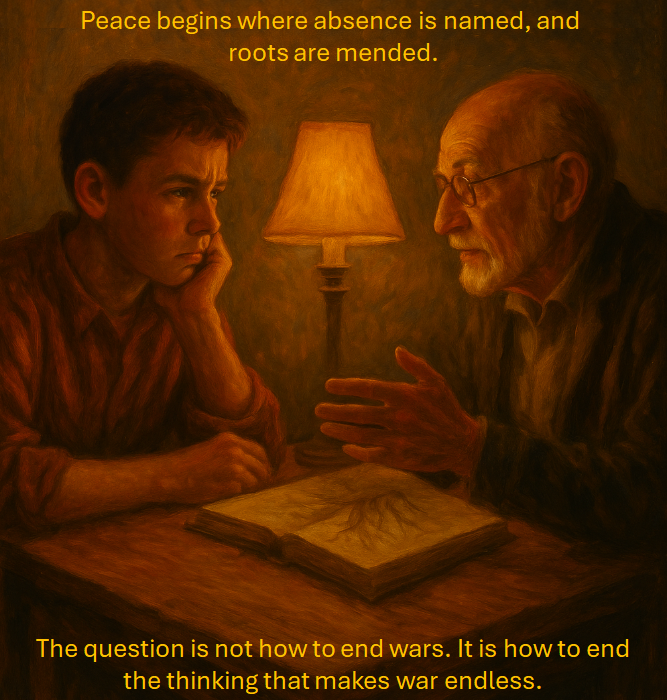
The lamps burned low in the little house, shadows of fig leaves trembling against the window. Emil sat at the table, his fingers tracing idle patterns across the wood grain. The day’s work in the forum still pulsed in his mind—the circle of chairs, the ledger passed hand to hand, the first fragile proposals like shoots breaking soil.
At last Emil spoke, his voice unsteady.
“Grandfather… we built a circle today. A new way of listening, of deciding. And it felt right, like sunlight reaching the forest floor. But tonight, I cannot stop thinking—what use is our small circle when the world outside drowns in wars and hatred? Nations tearing at each other. Brothers split by ideology. Families divided by pride. If power can be reshaped here, why does it fail everywhere else?”
Grandfather poured tea slowly, the steam curling between them like a living question. He did not answer at once. His eyes, calm and unhurried, seemed to hold Emil’s words the way one holds a seed, weighing its potential.
“It fails,” he said at last, “because the world looks for someone to blame, instead of learning how to see. Blame is smoke, Emil. Diagnosis finds the fire.”
He leaned forward, his voice steady, each phrase measured.
“The fire is always the same: the Four Absences. They are not merely personal. They are collective. And they move in a chain:
Forgetting life’s design… which leads to the erosion of values… which dehumanizes neighbors into enemies… which distorts instincts into cycles of fear and cruelty.”
He tapped the table with each link, the sound echoing like distant footsteps.
Emil frowned. “But what does that mean—truly mean—in the world’s wars?”
Grandfather lifted a hand, counting off with deliberate fingers.
“Absence One: Wisdom. Nations claim permanence—‘This land is eternally and exclusively ours’—forgetting that history itself is a test, not a possession. The test is whether we can learn from the past rather than be enslaved by it. Do we use past suffering to justify inflicting new suffering? Or do we use the memory of that suffering to break the cycle? Without this wisdom, all other conversations about values, humanity, and awareness are built on the false foundation of ‘mine, not yours.’
Absence Two: Values. Justice collapses into vengeance. Mercy is despised as weakness. Trust disappears, leaving nothing to build on. A society in this state lives by a reversed code: vengeance praised as strength, mercy scorned as betrayal, trust replaced by suspicion. The soil of human connection is poisoned—nothing new can grow. There is no foundation for a shared future, only a desperate defense of a contested past.
Absence Three: Humanity. This is the deepest wound. A neighbor becomes a number, a stereotype, a slur—‘terrorist,’ ‘occupier,’ ‘Nazi,’ ‘invader,’ ‘immigrants,’ ‘imperialist.’ Once the face is erased, restraint is erased with it. Actions once unthinkable become not only possible but easy. This is how ordinary people commit extraordinary evil. And Emil, do not think these absences only haunt nations. They creep into schools, families, friendships. You saw it when Lara and Marco looked at the Environmental Club—not as a group of passionate students, not as people, but as a budget drain. They did not see you as Emil, a conscientious soul. They saw you only as opposition.”
He raised a fourth finger.
“Absence Four: Awareness. Instincts twist. A desperate act of violence is called ‘terrorism,’ when it may be a distorted cry for dignity and safety. A brutal military response is called ‘security,’ when it is often a distorted hunger for permanence and recognition, blind to the humanity of the other.”
Emil’s brow tightened. “Then are we to excuse these things?”
“No,” Grandfather said firmly. “Diagnosis is not excuse. It is comprehension. To see why a fire burns is not to bless the flames—it is to know where to throw the water. Without diagnosis, every treaty is only a bandage on an untreated wound.”
The words sank into Emil’s chest, heavy as stone, yet strangely clarifying. He looked at his grandfather with a searching urgency. “And what water do we have?”
Grandfather opened a worn notebook and turned to a page marked by circles and roots branching toward light. He slid it across the table.
“Three streams,” he said. “First, a lens—to see through absence, not through blame. Second, a practice—to break reaction before it hardens into vengeance. I call it comprehension: to pause, to ask, which absence is speaking here? And third, a blueprint—for systems where peace is not fragile but inevitable. Systems of light: schools that teach dignity, laws that guard mercy, economies that reward cooperation. Structures where peace is not an exception but the default.”
Emil’s eyes traced the diagram, his fingertips brushing the lines as though they were veins in living wood. His voice dropped to a whisper. “So the question is not ‘how do we end this war,’ but ‘how do we end the thinking that makes war endless.’”
Grandfather smiled faintly, the lamplight deepening the lines of his face.
“Yes. That is the prerequisite for peace: shared comprehension. Until both sides can see the absences at their root, they will only trade blows above ground. But when they see together, they can begin to plant anew.”
The room fell quiet, the only sound the faint ticking of the kettle cooling on the hearth. Emil looked out the window at the fig tree, its branches stretching in silhouette against the night sky. For the first time, he did not imagine ending wars with speeches or banners. He imagined planting lenses, practices, systems—small seeds of comprehension that, given time, could grow into forests of peace.
Takeaway:
Peace cannot be achieved by silencing one side or by drafting treaties atop untreated wounds. The root of conflict is not merely in opposing armies but in the Four Absences: wisdom forgotten, values eroded, humanity denied, instincts distorted. Diagnosis—not blame—is the first step; only then can comprehension break cycles of reaction and systems of light make peace inevitable.

